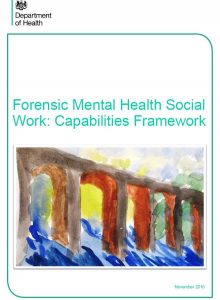For those of us working in or receiving support from forensic mental health settings, the role social workers play in ensuring that whole person and family approaches are taken is vital. They use their knowledge and relational skills to enable people - and the friends, family and carers closest to them - to work towards recovery and a brighter future.
 During my time as a social services inspector, I was privileged to inspect social work services provided in secure hospital and community settings. I saw first-hand the way in which social work values and relational approaches positively shaped multi-disciplinary support and treatment approaches to working with individuals.
During my time as a social services inspector, I was privileged to inspect social work services provided in secure hospital and community settings. I saw first-hand the way in which social work values and relational approaches positively shaped multi-disciplinary support and treatment approaches to working with individuals.
The high professional standards evidenced by forensic social workers (FSWs) were heartening and exemplified all that is best about the unique contribution they bring to improving people’s lives. I say this, not just in relation to individual and family work, but also their practice leadership influence within multi-disciplinary team cultures. The goal is always to put people at the centre of their care and support plans, balanced with appropriate protection.
I am therefore delighted to support today’s publication of a new forensic mental health social work framework. This important and valuable document has been developed with forensic social workers, managers, commissioners, multidisciplinary colleagues and, most importantly, the people and families whom they directly support.
Forensic social work is a highly specialist area of mental health work, combining generic skills and experiences with specialist knowledge – including an acute understanding of legal processes. Whilst the Mental Health Act 1983 is the main legal basis of decision making, FSWs must have a broader awareness of legal issues such as risk and public protection. They must also balance their judgments with personal liberty, human rights and the duties of the Care Act 2014.
FSWs work closely with a broad range of health and care professionals. Not surprisingly, maintaining their professional identity and perspective can sometimes be a challenge but it is one they strive to meet when serving the interests of those needing help.
If this all sounds rather complex, this new document serves as a route map for anyone embarking on a forensic social work career, identifying the capabilities, knowledge and skills needed at every stage.
Time is frequently a luxury in our profession but it is not uncommon for FSWs to work with individuals and families over extended periods, helping to navigate the path to recovery or rehabilitation following serious violent or sexual offending. Having a positive impact on a person’s growth and healing is a great privilege and one I know many social workers value highly.
So, if your passion for forensic social work is strong and/or you are keen to deploy FSWs in your locality, this document’s comprehensive career development framework provides all you need to make well informed decisions on commissioning, service design and delivery, practice assessment and the development of appropriate training to support practitioners.
More broadly, I am pleased to be able to provide another valuable resource to enhance our profession’s skills and knowledge and do even more to support and protect the individuals and families who need our help the most.
Leave a comment